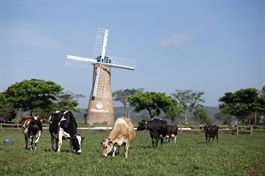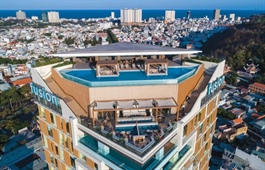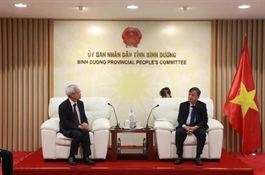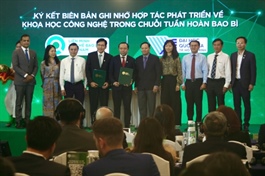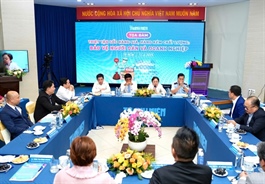Private investors keen to hop on board transport ventures
Private investors keen to hop on board transport ventures
The race to participate in North-South Expressway projects is heating up as more private businesses rush to secure a slot, anticipating open opportunities and supporting policies.
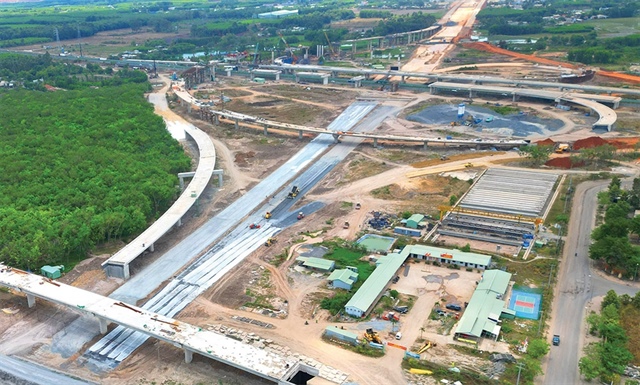
The North-South Expressway is a huge undertaking, divided into several componentsPhoto: Le Toan |
In early June, Phuong Thanh Transport Investment and Construction JSC sent a document to the prime minister and the Ministry of Construction proposing the expansion of certain sections of the North–South Expressway in the east under the public-private partnership (PPP) model.
The proposed sections include the Vung Ang to Van Ninh route with an investment of $638 million and the Phan Thiet–Dau Giay route, costing $175 million.
“Resolution No.68-NQ/TW is not only an encouragement, but also gives private enterprises great confidence in being protected, and in sharing issues when implementing PPP projects on transport infrastructure,” said Pham Van Khoi, chairman of Phuong Thanh.
“We will coordinate with other capable and experienced investors and contractors to successfully implement the projects. We commit not to use state budget capital and to bear all costs,” added Khoi.
According to Dr. Tran Chung, chairman of the Vietnam Association of Road Traffic Construction Investors, the fact that large enterprises in the transport sector are confidently submitting proposals shows the influence of Resolution 68 in activating private enterprises.
“Previously, the eastern section of the North-South Expressway was mainly publicly funded. However, the government’s policy is to switch to PPP investment, mobilising resources from society and private enterprises,” said Tran Chung. “There may be more newcomers joining the race.”
As stated in Resolution 68, the state commits to cutting at least 30 per cent of the time and cost of law compliance by the end of 2025, perfecting the post-inspection mechanism instead of pre-inspection to encourage innovation, and applying the principle of doing business in everything that is not prohibited by law.
Like Phuong Thanh, other giants are showing similar interest. Vietnam Infrastructure Development and Finance Investment Corporation (VIDIFI) also sent a proposal to the government in May, seeking to invest in expanding some sections under the PPP model without using state budget funding.
These sections highways with a total length of about 300km and funding of around $1.8 billion.
According to VIDIFI, it has worked with and reached agreement with State Capital Investment Corporation to jointly contribute capital and establish a consortium of investors. This is considered a proactive and strategic step to enhance financial, technical, and management capacity in implementing key infrastructure projects.
In similar moves, Son Hai Group has proposed that the prime minister approve the expansion of routes such as Hoai Nhon-Quy Nhon, Quy Nhon-Chi Thanh, Chi Thanh-Van Phong, and Van Phong-Nha Trang under the PPP format.
Son Hai Group proposed to coordinate with a number of capable investors to conduct research and carry out the expansion, and is committed to arranging all capital sources itself, with construction time not exceeding 24 months and a warranty for the project of 10 years.
Meanwhile, Deo Ca Group is also seeking government approval for its plan to expand the entire North-South Expressway in the eastern section from the current four-lane scale to six lanes. The expansion would cover 19 component projects with a total length of over 1,240km.
“When allowed to prepare plans in line with the law on PPP investment, we commit to completing the plan in order to meet the target of finishing expansion in 2027–2028,” said Nguyen Quang Huy, general director of Deo Ca Group.
It is estimated that if the overall project is divided into seven components, the total investment will be about $7.2 billion, of which the state budget will support about $500 million. If the project is divided into three components, the total investment is $7.24 billion, of which the state budget supports about $160 million, with the rest coming from the investor.
As of June 4, at least four domestic investors have submitted proposals to participate in the expansion of the eastern cluster of the North–South Expressway under the PPP model: Phuong Thanh Company, VIDIFI, Son Hai Group, and Deo Ca Group.
According to experts, private investment in the transport sector has yet to flourish due to challenges related to risk sharing and government guarantees.
Pham Huu Son, chairman of Transport Engineering Design Corporation, said, “This is the time to create a real revolution in the way infrastructure is developed, when the private sector is not only a participant, but is confidently the proposer and leader in key projects of national significance.”
Expert sharing
Tran Hong Minh, minister of Construction
In order to effectively implement Resolution 68, we need to develop in the coming time 2 million enterprises, strive to achieve a growth rate of 10-12 per cent, and achieve the goal of digital transformation and innovation as well as science and technology development, to rank third among ASEAN countries and fifth in Asia.
Implementing the direction of the government and the prime minister, the Ministry of Construction (MoC) has been working on 13 laws, more than 30 decrees, and over 100 circulars to reform administrative procedures in construction, aviation, railways, waterways, and transportation.
In particular, I see that decentralisation from the central government to local authorities is being strengthened, and local authorities are now taking on more responsibility.
We have so far truncated 134 out of 417 business conditions, and reduced 128 out of 361 procedures. We continue to achieve the goal of cutting 50 per cent of administrative procedures.
In the period of 2026-2030, we will build 26 expressways worth around $210 million, which are currently planned in the form of public investment.
The MoC recommends that the government allow businesses to participate in the PPP form to ease the burden on the national budget.
It is also expected that 12 national railway lines and 23 urban railway lines in Ho Chi Minh City and Hanoi will be developed before 2035, funded by the PPP model.
Developments in ports and waterways, inland waterway ports, and upgrading runways of airports also encourage enterprises to join, under the PPP model.
Pham Tan Cong, chairman Vietnam Chamber of Commerce and Industry
The business community is very excited about Resolution 68. Its spirit has never been as high as it is now.
The resolution covers many specific policies. It abolishes business licence tax or exempting income tax for three years for newly-established enterprises and others.
There are a number of bottlenecks in policies and administrative procedures. At present, there are many inappropriate business conditions and administrative procedures that need to be reduced or simplified.
For example, a land-use investment project has to carry out such procedures using at least 12 laws and more than 20 decrees or circulars, which are often changeable. Therefore, the time to complete the procedures is around 18-24 months, but normally about three years.
Currently, the government and the prime minister have been very determined in reforming such procedures and the situation is also improving continuously. We hope that this administrative reform will continue to be strengthened.
Resolution 68 encourages domestic businesses to make better steps. Proving this is that two large domestic enterprises have proposed to invest in high-speed railway projects, showing that they are no longer hesitant, and ready to accept risks when doing business.
In order to solve bottlenecks, I propose that in implementing Resolution 68, it is necessary to promote more strongly, substantially, and effectively the role of the business community and organisations in participating.
In reform of administrative procedures, it is necessary to boost institution improvement, and build a favourable business environment to enhance the active and proactive participation of enterprises. The private economy is a driving force, so it should be more proactive and encourged to contribute to policy making.
- 14:00 16/06/2025





